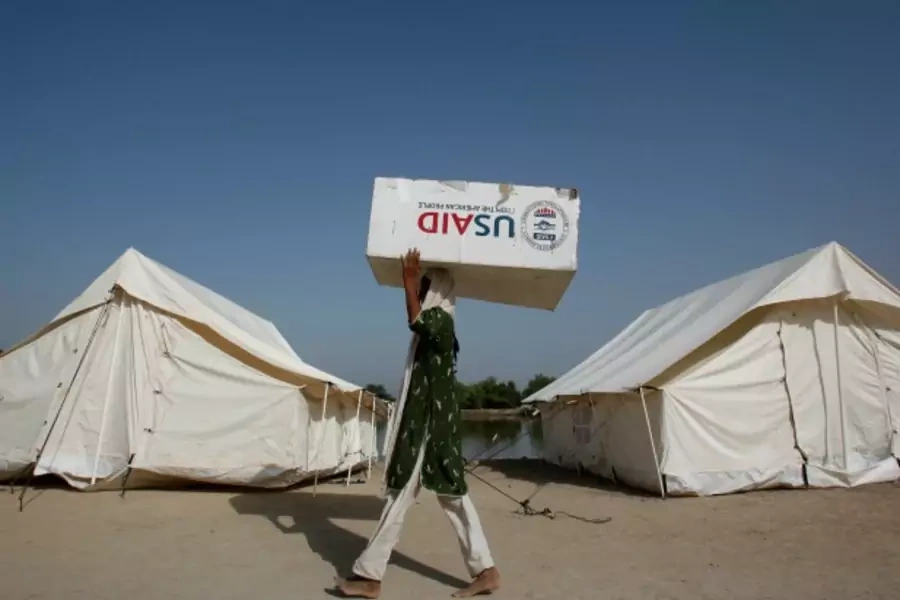Politics and Development Together Again

More on:
The United States has spent about $100 billion rebuilding Afghanistan since 2002 – an enormous amount of money that even a casual observer can tell has fallen far short of its aims. Perhaps the reconstruction efforts were doomed from the start: while aid agencies were discussing rule of law and democracy, U.S. policymakers were cutting deals with warlords who soon dominated the country’s new parliament.
The bottom line is that when it comes to economic development, politics matter. This might seem obvious, but it is a lesson that is forgotten, contested, or ignored time and again. A new thought-provoking book, Development Aid Confronts Politics: The Almost Revolution, by Thomas Carothers and Diane de Gramont, chronicles the dangers of excluding politics from development aid, and cheers on the trend of development efforts becoming more explicitly political. The book is an important contribution to the existing literature on the politics of development and ties in well with Pathways to Freedom: Political and Economic Lessons from Democratic Transitions, a new CFR book I recently co-edited that examines the relationship between development and democratization.
As Carothers and de Gramont point out, the modern conception of foreign aid grew out of a political context: Washington’s Cold War efforts to stop the spread of Communism. But in this pursuit, policymakers and aid organizations paid little attention to the political situation in countries receiving aid. The underlying assumption was that, regardless of a country’s cultural and political background, foreign aid would foster civil society and liberal democracy. But, as Carothers and de Gramont recount, this approach proved woefully flawed. In countries around the world, foreign aid has been rendered ineffective due to a lack of understanding of countries’ political dynamics. Even where foreign aid has helped spur economic growth, it has seldom automatically led to democratization. In reaction, beginning in the 1980s and 1990s, the development establishment -- long dominated by technocratic economists eager to stay out of politics – began, gingerly, to take political considerations into account when crafting aid policy.
This reorientation toward politically-informed development has been unevenly adopted, which is part of the reason why Carothers and de Gramont set out to write Development Aid Confronts Politics. As Carothers recounts in an interview with The Guardian, “I was struck first by how little communication existed between those working on the political side of assistance and those on the socioeconomic side and second by how much misunderstanding and even suspicion there was between the two camps... For me, this book is one result of a longtime preoccupation with how to achieve more synthetic, integrated approaches to development.” Indeed, the book provides valuable insights into the importance of coordinated campaigns and politically-minded development agendas.
To be sure, politically-oriented development efforts have met resistance abroad. The legacy of imperialism in many developing countries perpetuates an understandable suspicion of Western organizations becoming politically involved in foreign countries. And anti-American populism makes for good politics in places like Russia and Bolivia. As a result, political aid organizations have recently been kicked out of several countries, accused of fomenting domestic unrest there; and some aid workers have even been convicted of crimes against the state. In reality, most foreign organizations take part in largely uncontroversial aspects of politics, such as election monitoring. Still, pervasive distrust of Western political aid has led many to call on newly established democracies, such as Brazil, India, and Turkey, to help countries of similar cultural backgrounds stabilize and democratize.
Despite these complex geopolitical dynamics, Carothers and de Gramont argue forcefully that it is foolish for aid givers to pull back from or ignore the messy realities of politics. In Pathways to Freedom, my colleague Terra Lawson-Remer and I make a similar point: open and prosperous societies ultimately depend on a well-functioning civil society and rule of law. Those in the aid business who think they can improve economic outcomes over the long term while ignoring human rights and governance issues are kidding themselves.
More on:
 Online Store
Online Store
